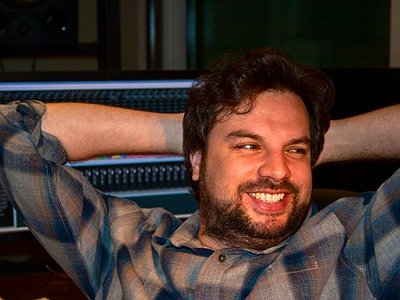Part 2.
What, to you, are the main functions and goals of soundtracks and film music and how would you rate their importance for the movie as a whole?
Film music can do so many different things. It can provide bold emotions from heroism to despair, or it can be subtle, almost inaudible. Film music can help explain something that isn’t on screen, it can fill in the gaps, or it can augment something. If it can do any of this and still be in someway memorable, then you are doing something right. Also, sometimes it can do more mundane things, like keep the pace of a scene moving if it might be dragging or fixing problems with performance.
Jerry Goldsmith once asserted that, as a composer, one "can't be visual with the music". How do you see the relationship between image and sound in a movie? How directly are you working with the images in the writing process?
Not entirely sure what the Goldsmith quote means: maybe he is saying that you don’t need the music to ape the visuals, and if that is the case I wholeheartedly agree (for most of the time). The visuals give the form for the music; between the many layers of the visuals, the dialogue and the sound effects, the music has to intertwine and find its path. Before I start scoring to picture, I really try and analyse what I am looking at, not only on a surface level, but also deep beneath that.
Elliot Goldenthal mentioned that while a movie is "going linearly from side to side", you have to talk about film music "vertically". What's your take on this statement?
Not quite sure what this means. The only comment I have is that when I start on a score, I know I am looking at specific moments in time, but as I get further along I try and see the bigger picture and try and relate pieces of music to each other.
Scores can either exist entirely of original material or temp-track music. Are these two approaches equal or do you feel as though a soundtrack written especially for a movie is always to be preferred?
I don’t know of too many movies where the temp track has ended up in the final thing, although I can think of a few. Presumably any movie that has had something bespoke written for it would be the preferable thing? Perhaps you are referring to source music when you mention temp-track music? If so, I think it can be very interesting to bring in a piece of music that has it’s own baggage attached to it, or it can be disastrous. I’ve seen both sides of this!
People tend to see film music as existing in a time of its own. Would you, on the other hand, say that there such a thing as zeitgeist in film music as well? Are there compositional devices which you don't find appropriate or wouldn't use right now, because they're too closely associated with a particular era?
When people talk about ‘film music’ I think they are often referring to a golden age of film scoring which is tuneful, largely symphonic and very organic sounding. I adore films with these scores, and would kill to work on a movie that can take those sensibilities. However, aesthetics have changed over the last 40 years or so. Electronic music now plays a far bigger role in scoring. Indeed there are scores that are so electronic that the lines between sound design and music are totally blurred. Some of these modern approaches really irk dyed-in-the-wool traditional soundtrack collectors, and I think that is a shame, as although I may not choose to listen to a CD of ambient electronic minimalism, it might be just the right thing for a movie. We should celebrate that when scoring a movie today, we have far greater choices of sound to pick from, be they overly musical or not, than we have in the past.
The balance between visuals, fx and film music is a delicate one. What, from your point of view, determines whether or not it is a successful one?
Tricky one, but I think the word 'balance' is key. For my own tastes, I am not a fan of a simultaneous assault on all the senses. So when I see and hear a huge explosion on screen with loads of CGI, people screaming, metal grating, I would try and resist getting involved on a musical level at that point. My score might lead us there, or comment after the event, but I would imagine it could be entirely redundant to try and compete with all that, and could just be plain ugly. I like the idea of music entering in interesting and meaningful places rather than just hanging around or hitting people over the head.
In your opinion, should film music remain connected to the picture it was conceived for or should have it an intrinsic value outside of the movies?
If it has a life outside of the picture it was written for then that is great. I can say of the scores I have written about half ‘work’ on a soundtrack album and the other half don’t. Obviously, the job a film composer is being paid for is to write music to picture.
Usually, it is considered that it is the job of the movie to win over an audience. But watching and listening are also active, rather than just passive processes. How do you see the role of the spectator in the cinematic communication process?
Yes, of course, it is the job of all the contributors to a movie to stimulate the audience in their own way. I guess as time goes on, more and more senses will be involved. How long until smell, taste and touch are included in our cinematic experience?. How hard the movie or audience member has to work really depends on the genre of picture being made.
Visit David Buckley's website at davidbuckleymusic.net






